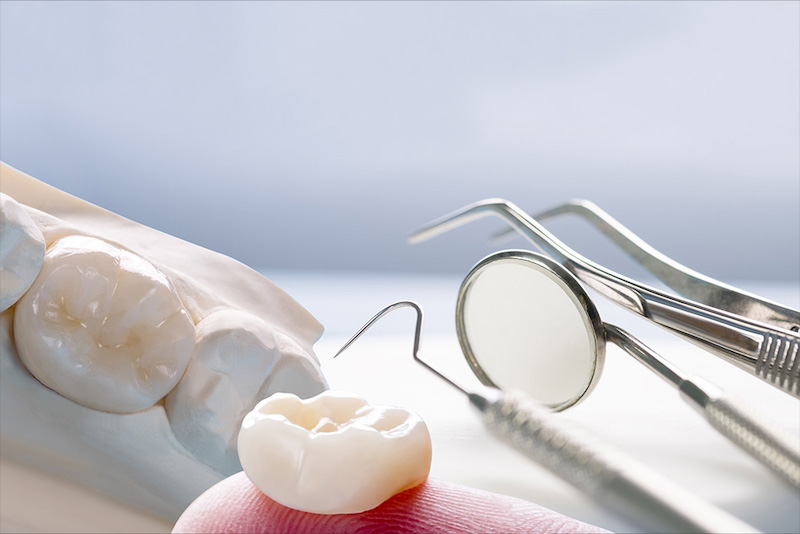If you’ve ever wondered about enhancing your smile, protecting a damaged tooth, or simply want to dive deep into the topic, you’re in the right place. Dental crowns, often heralded as the crown jewels of cosmetic dentistry, have both aesthetic and functional benefits. Let’s uncover the what, why, and how of these dental wonders, and see if they’re the right fit for your pearly whites!
Do I Really Need a Crown?
Cosmetic crowns, often simply referred to as “dental crowns”, are not just a fad in the cosmetic dentistry world. These serve both functional and aesthetic purposes. Here’s when you might need one:
Tooth Damage: When your tooth is broken or has suffered significant decay, a crown can be the savior. It covers the tooth, protecting it from further damage.
After a Root Canal: After certain procedures like a root canal, the tooth becomes fragile. A crown gives it strength and restores its function.
Cosmetic Enhancement: Have a discolored or misshapen tooth? Crowns can cover such imperfections, improving the appearance of your smile.
When Should I Consult a Dentist?
If you notice any of the above signs, or if you’re simply unhappy with how a particular tooth or teeth look, scheduling a consultation is the first step. Remember, the earlier you act, the better it is for your oral health.
What Happens When You Get a Crown?
Getting a crown is not an instant process, but thanks to modern dentistry, it’s relatively straightforward and painless:
Consultation and Examination: Your dental journey begins here. Our team examines the condition of your teeth and determines if a crown is suitable.
Tooth Preparation: The tooth that will receive the crown is filed down to make space for it. Don’t worry; it’s usually done under local anesthesia, so you won’t feel a thing!
Impression Taking: A mold or digital impression of the prepared tooth is taken. This helps in crafting a crown that perfectly fits your tooth.
Temporary Crown: You won’t leave the clinic with a gap! A temporary crown is placed while the permanent one is being crafted.
Placing the Permanent Crown: Once ready, you’ll come back for a second visit. The temporary crown is removed, and the permanent one is cemented in place.
Post-Procedure Care
After the procedure, some sensitivity is normal. Use a soft-bristled toothbrush, avoid very hot or cold foods, and consider using toothpaste designed for sensitive teeth. Remember, regular dental check-ups ensure the longevity of your crown.
How Long Do Dental Crowns Last?
The lifespan of a dental crown largely depends on a few factors:
Material of the Crown: Porcelain, resin, ceramic, or metal – the choice of material can influence the durability. For instance, porcelain fused to metal tends to be stronger than resin.
Oral Habits: Do you have a habit of grinding your teeth or biting nails? Such habits can reduce the life of your crown.
Dental Hygiene: Regular brushing, flossing, and dental check-ups play a pivotal role in prolonging the life of your crown.
What’s the Average Lifespan?
On average, dental crowns can last between 5 to 15 years. With excellent care, some crowns even last for 20 years or more!
Is the Procedure Painful?
One of the primary concerns that many have is the pain associated with getting a crown. But let’s bust that myth!
Anesthesia: The tooth preparation stage is typically done under local anesthesia. This ensures you don’t feel any pain during the procedure.
Mild Discomfort: After the anesthesia wears off, you might feel some discomfort or sensitivity, which usually subsides in a few days.
Speak Up: If at any point during the procedure you feel discomfort, always let your dentist know. The goal is to make the process as comfortable as possible for you.
Are All Crowns Created Equal?
With advancements in dental technology, crowns can now be made from a range of materials. Each comes with its pros and cons:
Porcelain: A favorite for its natural look, mimicking the translucency of real teeth.
Resin: Cost-effective and easy to fit but may wear down faster than other materials.
Ceramic: An excellent choice for those with metal allergies, providing a sturdy, tooth-colored crown.
Metal Alloys: Known for their durability, metal crowns are strong and long-lasting but are often used for molars due to their metallic color.
It’s essential to consult with your dentist to choose the right material that suits both your dental needs and your budget.
Maintaining Your Cosmetic Crown
Just like your natural teeth, cosmetic crowns need love and care. Here’s how you can ensure they remain in top-notch condition:
Daily Brushing and Flossing: Ensure you’re cleaning around the crown to prevent plaque buildup.
Avoid Hard Foods: Biting on hard candies or ice can risk chipping your crown, especially if it’s porcelain or ceramic.
Regular Dental Check-ups: Routine visits will ensure your crown remains well-fitted and in good condition.
Cosmetic Crowns and Self-Confidence
It’s incredible how a change in our smile can influence our confidence levels:
Face the World with a Smile: With a crown restoring a broken or decayed tooth, you can smile without hesitation.
Improved Speech: Misaligned or missing teeth can affect speech. Crowns can help rectify such issues, making conversations clearer.
Chew with Ease: No more avoiding certain foods due to tooth sensitivity or damage.
Remember, cosmetic crowns are not just about aesthetics; they significantly impact our daily lives, making simple joys like eating and speaking more pleasurable.
In conclusion, cosmetic crowns are a remarkable blend of functional restoration and aesthetic enhancement. Whether you need to protect a vulnerable tooth or are looking to get that picture-perfect smile, crowns might just be the answer.
If you’re considering getting a crown or just want to learn more, schedule a consultation with our clinic. We’re here to guide you through every step of your dental journey.

